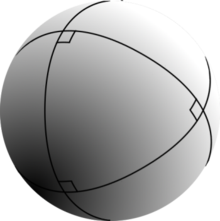In geometry, an octant of a sphere is a spherical triangle with three right angles and three right sides. It is sometimes called a trirectangular (spherical) triangle.[1] It is one face of a spherical octahedron.

For a sphere embedded in three-dimensional Euclidean space, the vectors from the sphere's center to each vertex of an octant are the basis vectors of a Cartesian coordinate system relative to which the sphere is a unit sphere. The spherical octant itself is the intersection of the sphere with one octant of space.
Uniquely among spherical triangles, the octant is its own polar triangle.[2]
The octant can be parametrized using a rational quartic Bézier triangle.[3]
The solid angle subtended by a spherical octant is π/2 sr, one-eight of the solid angle of a sphere.[4]
See also
editNotes
edit- ^ Legendre, Adrien-Marie (1858). Davies, Charles (ed.). Elements of Geometry and Trigonometry. New York: A. S. Barnes & Co. p. 197.
- ^ Coxeter, H. S. M. (1982). "Rational spherical triangles". The Mathematical Gazette. 66 (436): 145–147. doi:10.2307/3617755. JSTOR 3617755.
- ^ Farin, G.; Piper, B.; Worsey, Andrew J. (1987). "The octant of a sphere as a non-degenerate triangular Bézier patch". Computer Aided Geometric Design. 4 (4): 329–332. doi:10.1016/0167-8396(87)90007-0.
- ^ "octant". PlanetMath.org. 2013-03-22. Retrieved 2024-10-21.